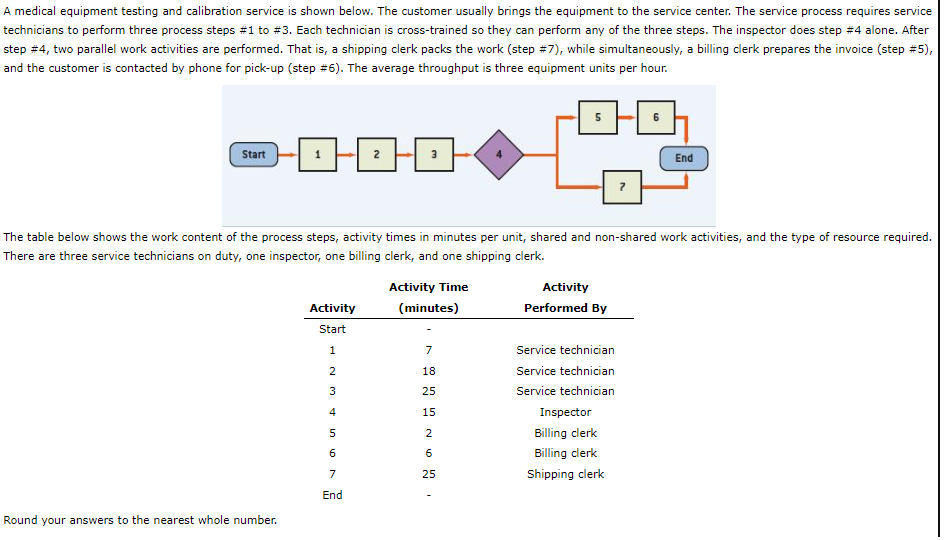A medical equipment testing and calibration service is shown below. The customer usually brings the equipment to the service center. The service process requires service technicians to perform three process steps #1 to #3. Each technician is cross-trained so they can perform any of the three steps. The inspector does step #4 alone. After step #4, two parallel work activities are performed. That is, a shipping clerk packs the work (step #7), while simultaneously, a billing clerk prepares the invoice (step #5), and the customer is contacted by phone for pick-up (step #6). The average throughput is three equipment units per hour. The table below shows the work content of the process steps, activity times in minutes per unit, shared and non-shared work activities, and the type of resource required. There are three service technicians on duty, one inspector, one billing clerk, and one shipping clerk. Activity Time Activity Activity (minutes) Performed By Start - 1 7 Service technician 2 18 Service technician 3 25 Service technician 4 15 Inspector 5 2 Billing clerk 6 6 Billing clerk 7 25 Shipping clerk End - Round your answers to the nearest whole number. What is the service rate for the service technician? minutes/unit What is the labor utilization rate (%) for the billing clerk? % What is the labor utilization rate (%) for the service technician? % Calculate the labor utilization rates (%) for the inspector and the shipping clerk. Inspector utilization: % Shipping clerk utilization: % What job represents the bottleneck in this process? The job is the bottleneck.
A medical equipment testing and calibration service is shown below. The customer usually brings the equipment to the service center. The service process requires service technicians to perform three process steps #1 to #3. Each technician is cross-trained so they can perform any of the three steps. The inspector does step #4 alone. After step #4, two parallel work activities are performed. That is, a shipping clerk packs the work (step #7), while simultaneously, a billing clerk prepares the invoice (step #5), and the customer is contacted by phone for pick-up (step #6). The average throughput is three equipment units per hour.
The table below shows the work content of the process steps, activity times in minutes per unit, shared and non-shared work activities, and the type of resource required. There are three service technicians on duty, one inspector, one billing clerk, and one shipping clerk.
| Activity Time | Activity | |
| Activity | (minutes) | Performed By |
| Start | - | |
| 1 | 7 | Service technician |
| 2 | 18 | Service technician |
| 3 | 25 | Service technician |
| 4 | 15 | Inspector |
| 5 | 2 | Billing clerk |
| 6 | 6 | Billing clerk |
| 7 | 25 | Shipping clerk |
| End | - |
Round your answers to the nearest whole number.
-
What is the service rate for the service technician?
minutes/unit
-
What is the labor utilization rate (%) for the billing clerk?
%
-
What is the labor utilization rate (%) for the service technician?
%
-
Calculate the labor utilization rates (%) for the inspector and the shipping clerk.
Inspector utilization: %
Shipping clerk utilization: %
What job represents the bottleneck in this process?
The job is the bottleneck.

Trending now
This is a popular solution!
Step by step
Solved in 3 steps with 2 images


